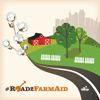 Today’s #Road2FarmAid blog post comes from Thom Duffy, special features editor of Billboard Magazine.
Today’s #Road2FarmAid blog post comes from Thom Duffy, special features editor of Billboard Magazine.
It took me years to attend my first Farm Aid concert. But I feel like I’ve been with them since the beginning.
I grew up listening to musicians who wanted to change our society, to challenge inequality, to end a war, to talk truth to power.
At the start of my journalism career, I had been a political reporter, until I realized the artists have far more impact on our world than the politicians.
So in July 1985, I was standing near stage, notebook in hand, at the Live Aid concert in Philadelphia, staged for African famine relief. I remember when Bob Dylan came out late in the day and remarked: “Wouldn’t it be great if we did something for our own farmers right here in America?”
At the time, falling crop prices and rising debt payments had ignited a wave of foreclosures that were pushing family farmers off of their land.
That August, Willie Nelson was booked to play the Illinois State Fair in Springfield. In an interview for the remarkable 2005 book “Farm Aid: A Song for America,” his then-booking agent Tony Conway of Buddy Lee Attractions recalled: “Out of the blue, Willie said to me, ‘I want to do a concert for American farmers. I want to see if we can do it here in Illinois; I don’t care where, just someplace we can get a stadium.'”
For anyone who has the slightest knowledge of concert production, it seems amazing that Willie and his team pulled it off. That inaugural Farm Aid concert was staged on an all-but-impossibly short lead time at the University of Illinois Memorial Stadium in Champaign on Sept. 22, 1985.
For me, in the years that followed, Farm Aid seemed to shift in and out of view, as other stories demanded my time and attention. I came to work for Billboard magazine, documenting each week the dramatic changes in the music industry — and the shift of music’s power to providing a soundtrack for advertisements or branding deals.
Without realizing it, however, my personal concerns began to parallel those of Farm Aid.
My oldest friend gave up selling real estate and, with her husband and grown children, opened two farm-to-table restaurants in Saratoga Springs, N.Y. My wife and I moved with our two young children to Brooklyn in the late 1990s where we were delighted to find flourishing farmers markets. We joined a community supported agriculture group in our neighborhood. I always volunteered for the early shift, when the truck full of marvelously fresh vegetables, eggs and flowers rolled up just after dawn from Garden of Eve in Riverhead, N.Y.
Chris and Eve Kaplan-Walbrecht were *our* family farmers. Their truck each weekend brought us edible treasure.
And I began to see the connections between how we treat our farmers, how we grow our food, and how we treat our land with issues ranging from our national health crisis to our battle against global warming.
In recent years, I’ve happily learned again that the circle is truly unbroken, as the personal and professional came together
At Billboard, I learned I would have the opportunity to prepare a special feature on Farm Aid. I’m an editor now, so normally I assign others to write such features. Not this time. This one meant too much to me personally.
Seeking to capture the essence of the organization, I wrote:
This is what the music business has long known about Farm Aid:
On one day, each year, since 1985, Farm Aid co-founders Willie Nelson, Neil Young and John Mellencamp have gathered an all-star roster of musicians for a high-profile benefit concert to support the men and women who help feed America.
“With Dave Matthews later joining the organization’s board in 2001, Farm Aid through the years has welcomed hundreds of artists to its stage, beginning with the inaugural event in Champaign, Ill.. Along the way, it has raised millions to help America’s family farmers.
This is what the music business may not know about Farm Aid:
The support of the music industry has helped Farm Aid influence a profound shift in the cultural landscape of the country during the past quarter century.
Farm Aid deserves credit for promoting many of the positive developments in food culture in the United States in recent years: the growth of farmers markets, the rise of community-supported agriculture groups, the spread of farm-to-table “slow food” restaurants and the wider use of sustainable farming practices.
The organization’s work, as Nelson has often said, simply affects everyone who eats.
I’ve been privileged to cover Farm Aid for Billboard for the past two years, in 2012 in Hersey, Pa.
And in 2013 in Saratoga Springs, as legendary music activist Pete Seeger gave one of the final performances of his life.
The real marvel of Farm Aid was not the ability to pull off that first show within weeks in 1985.
In a music industry of fleeting concerns, it is the depth and length of the commitment of Willie Nelson, Neil Young, John Mellencamp, Dave Matthews and many other artists, along with the organization’s remarkable staff—and, of course, the farmers themselves— to the cause of protecting our food supply.
I wasn’t there at the beginning for Farm Aid. But I’ll stand with them from now on.
Photo by Ebet Roberts.
Click here to learn more about Thom Duffy.


